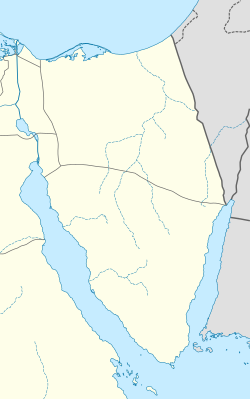| Attack Al-Arish 2016 | |
|---|---|
| Part of Sinai insurgency | |
| Location | Arish, North Sinai Governorate, Egypt |
| Deaths | 13 |
| Injured | 0 |
| Victims | Soldiers and policemen |
| Perpetrators | |
Location on the Sinai Peninsula of the three cities attacked in January 2015 by Wilayat Sinai.
The 2016 el Arish attack was a mortar attack by ISIS on March 20, 2016 in which thirteen Egyptian policemen and soldiers were killed at a security checkpoint in Sinai's Al-Arish. [1] [2]
According to the Egyptian Ministry of Interior, the mortar attack targeted Al-Safa checkpoint and at least 13 police officers and soldiers died. [3] [4] [5] [6]
